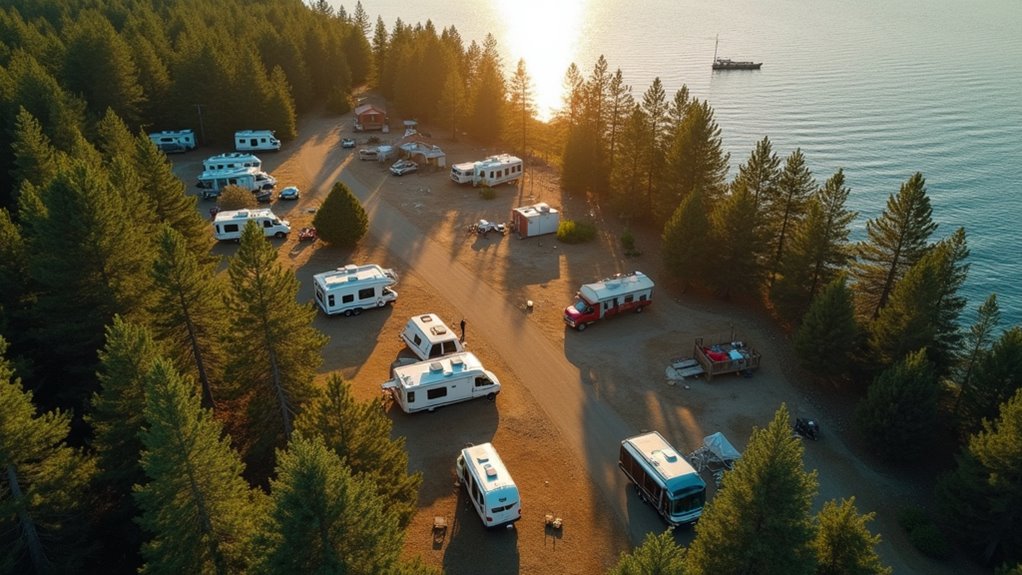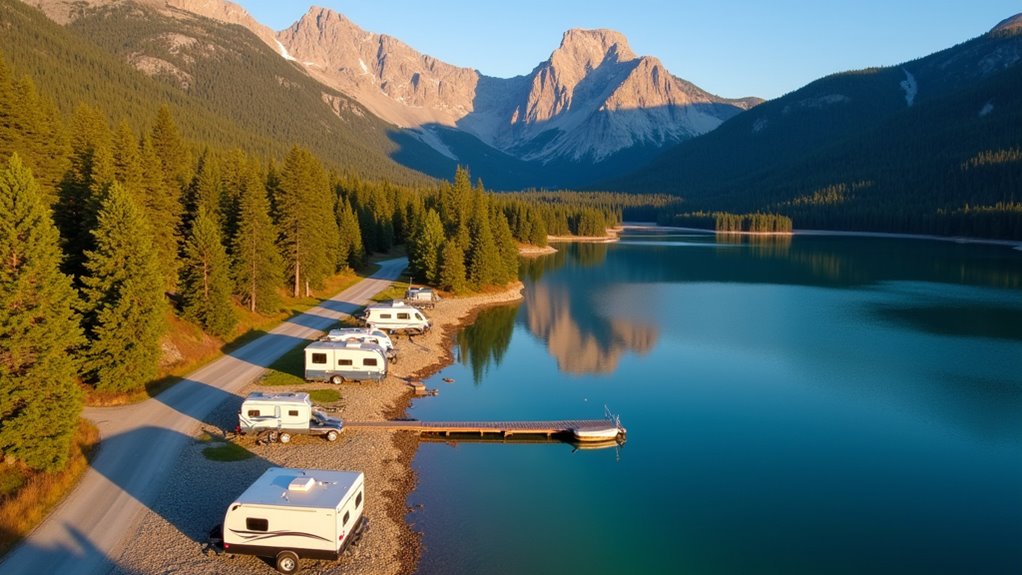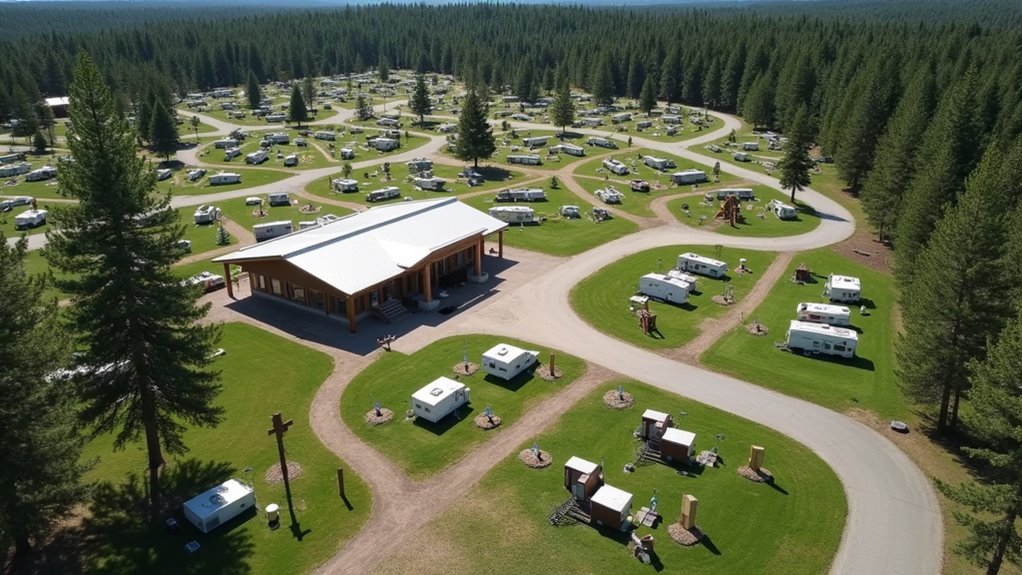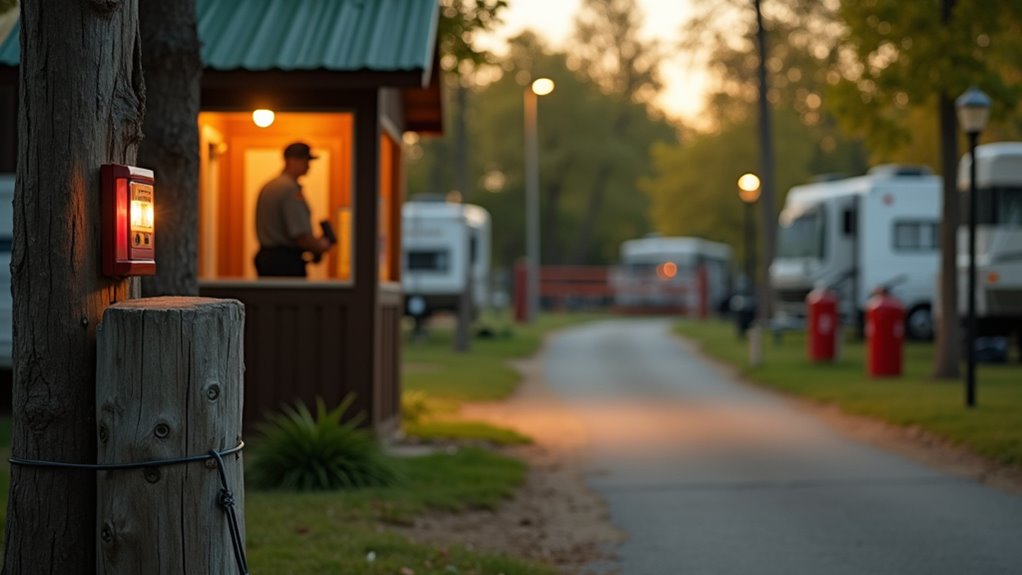Physical Address
304 North Cardinal St.
Dorchester Center, MA 02124
Physical Address
304 North Cardinal St.
Dorchester Center, MA 02124

Over 40% of campers regret their site choices—discover the insider secrets that guarantee you'll find perfect campgrounds every time.
You’re tired of arriving at campgrounds that don’t match your expectations, aren’t you? Whether you’re dealing with overcrowded sites, missing amenities, or surprise fees that blow your budget, finding the right campground shouldn’t feel like gambling. The difference between a memorable outdoor adventure and a frustrating weekend often comes down to knowing exactly what to look for before you book. Here’s how smart campers consistently find spots that deliver value without breaking the bank.

Before you start scrolling through campground websites or apps, you’ll need to get clear on what type of camping experience you’re after. Are you a tent camper who loves roughing it, or do you prefer RV hookups with full amenities? Consider your non-negotiables first: Do you need restrooms and showers, or can you manage without? What about Wi-Fi, laundry facilities, or camp stores?
Think about your group’s needs too. Traveling with kids means playgrounds and swimming areas become priorities. If you’re bringing pets, you’ll want dog-friendly policies and designated areas. Your budget also matters – state parks typically cost less than private campgrounds with resort-style amenities.
Just like researching travel insurance, taking time to identify your specific needs will help you make the best choice for your camping adventure.
Write down your must-haves versus nice-to-haves before searching.
Once you’ve identified your camping priorities, start hunting for real feedback from fellow campers who’ve actually stayed at your potential destinations. You’ll find honest reviews on sites like Recreation.gov, Campendium, and Google Reviews that reveal what campground websites won’t tell you.
Pay attention to recent reviews since conditions change frequently. Look for patterns in complaints—if multiple people mention dirty restrooms or aggressive wildlife, take note. Check photos uploaded by reviewers to see actual site conditions versus promotional images.
Don’t just focus on star ratings; read the detailed comments. One person’s “too crowded” might be another’s “lively atmosphere.” Filter reviews by your camping style—RV reviews won’t help tent campers much.
Save money by avoiding highly-rated but overpriced spots when budget-friendly alternatives nearby offer similar experiences. Consider what camping activities you and your partner want to enjoy together when evaluating different campground options.

While stunning photos might draw you to remote wilderness campgrounds, you’ll need to honestly assess whether your vehicle can handle the journey there. Check road conditions—some campgrounds require high-clearance vehicles or 4WD to navigate rough terrain, steep grades, or creek crossings.
Consider distance from essential services. Remote locations mean longer drives for groceries, gas, or medical emergencies. If you’re tent camping, factor in how far you’ll carry gear from parking areas.
Review accessibility features if needed. Some campgrounds offer paved paths, accessible restrooms, and level campsites for wheelchairs or mobility aids.
Don’t forget cell service requirements. Many remote spots have zero coverage, which could be problematic for work calls or emergencies. Apps like CellMapper help predict signal strength before you arrive.
Taking time to evaluate these 15 factors during your campsite selection process will help ensure your camping trip meets your specific needs and expectations.
After confirming you can reach your chosen campground, you’ll want to match available facilities with your camping style and budget. Start by identifying your non-negotiables: Do you need electrical hookups for your RV? Clean restrooms and hot showers? Potable water access?
Consider amenities that enhance your experience without breaking the bank. Fire pits, picnic tables, and grills are standard at most campgrounds. Swimming areas, hiking trails, and playgrounds add value for families. Wi-Fi and camp stores offer convenience but often cost extra.
Compare facility quality through recent reviews and photos. Look for mentions of cleanliness, maintenance issues, and staff responsiveness. Budget-friendly campgrounds might have basic facilities that still meet your needs perfectly. Don’t pay premium prices for amenities you won’t use.
Quality camping gear like the Montane Featherlite Smock can enhance your outdoor experience regardless of which campground facilities you choose.

Since booking policies vary dramatically between campgrounds, you’ll save time and avoid disappointment by understanding each location’s specific requirements before you start planning.
Check cancellation policies first—some charge hefty fees while others offer full refunds with adequate notice.
Note minimum stay requirements, especially during peak seasons when many campgrounds require week-long bookings.
Download campground-specific apps or bookmark their websites since popular spots fill up months in advance.
State parks often release reservations exactly five months out, so mark your calendar.
Private campgrounds may accept bookings year-round but charge higher rates during holidays.
Always read the fine print regarding deposits, pet fees, and vehicle limits.
Consider joining camping clubs for member discounts and priority booking access at affiliated locations.
Some specialized locations may also offer access to unique activities like glacier climbing trails for those seeking more adventurous camping experiences.
Timing your camping trip around seasonal patterns can make or break your outdoor experience—and your budget. Peak season means higher prices and crowded sites, while shoulder seasons offer better deals and fewer crowds. Check campground operating schedules since many close during winter months or limit services off-season.
Research local weather patterns before booking. Desert campgrounds become unbearable in summer heat, while mountain sites may have snow through late spring. Coastal areas can be foggy during certain months, affecting visibility and temperatures.
Consider your gear’s weather limitations. If you don’t own cold-weather equipment, avoid late fall or early spring bookings in northern regions.
Plan around local events, hunting seasons, or school holidays that might affect availability and pricing. Smart timing guarantees money saved and ensures better camping conditions.
Remember to pack your hiking bag with essential items appropriate for the season and conditions you’ll encounter at your chosen campground.

While beautiful scenery matters, your safety should top every campground selection checklist. Look for well-lit pathways, functioning emergency phones, and clear exit routes throughout the grounds.
Check if there’s on-site security or camp hosts who patrol regularly, especially during nighttime hours.
Read recent reviews mentioning safety concerns like theft, wildlife encounters, or poorly maintained facilities. You’ll want campgrounds with secure gates, adequate lighting near restrooms and common areas, and reliable cell phone coverage for emergencies.
Don’t forget practical safety features: fire extinguishers near fire pits, first aid stations, and posted emergency contact numbers.
Budget-friendly campgrounds can still offer excellent security – state parks often provide ranger presence without premium pricing.
If you’re planning to explore mountainous regions, consider campgrounds near the Andes which offer unique adventure opportunities while maintaining essential safety standards.
Trust your instincts when visiting; if something feels off, keep looking elsewhere.
How much will your camping trip actually cost once you factor in all the extras? Don’t let surprise fees derail your budget. Smart campers always dig deeper than the advertised nightly rate.
Start by requesting a complete fee breakdown upfront. Many campgrounds tack on charges that aren’t obvious during initial booking.
Compare total costs, not just base prices, when evaluating options.
Watch out for these common hidden expenses:
Ask about discounts too. Many campgrounds offer military, senior, or membership rates that’ll substantially reduce your total.
You’ll make better decisions when you know the real bottom line. Understanding all costs upfront also helps you become a more responsible camper who respects both the environment and fellow outdoor enthusiasts.
Picture yourself settling into the perfect campsite as golden hour light filters through towering pines, knowing you’ve found your ideal outdoor sanctuary without breaking the bank. You’ve done your homework—checked reviews, compared costs, and secured your spot. Now you’re ready to create lasting memories around the campfire. Trust your research, stick to your budget, and don’t forget to enjoy the simple pleasure of disconnecting under a blanket of stars.